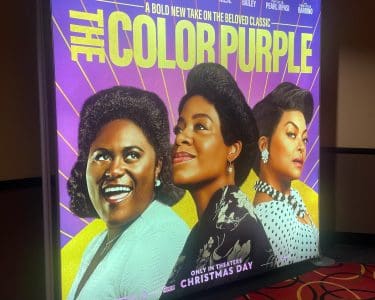Director Justin Simien’s Dear White People is the kind of film that’s easy to praise for what it attempts to do rather than what it actually succeeds at. The tale of four students at the fictional Winchester University examines racial, cultural and class divides among the student body, each one serving as a stand-in for societal archetypes. With an on-the-nose reference to Robert Altman and the Simien’s ensemble approach, it’s clear that Dear White People aspires to be a bit of a cross-breed between Altman’s finest works (Nashville, Short Cuts) and the racial examinations offered by Spike Lee’s late ’80s classics (Do the Right Thing, School Daze).
Tessa Thompson is Samantha White, the host of a radio program called “Dear White People,” who is outspoken and controversial on campus. “Everybody Hates Chris” star Tyler James Williams is Lionel, a gay black student (and Robert Altman fan) who feels isolated from his black classmates because of his tastes and interests. Coco, played by Teyonah Parris (“Mad Men,” “Survivor’s Remorse”), is viewed as a “sell-out” by her black schoolmates due to her more subdued radio show (as compared to Samantha’s), affinity for white guys and other factors. And Kyle Gallner is Kurt, the obnoxious editor for a school paper.
Through these characters, the viewer is introduced to many variances on what it means to be black in an environment in which you are the minority; and what it means to be black among your own people and amid their expectations of what “being black” actually means. As Coco, Parris communicates the conflict of her character’s ambitions and the reality of racism — a duality that is played out most memorably at a campus party that’s extremely inappropriate. And Williams, as Lionel, deftly navigates the young man’s struggles with his sexuality and personality, showcasing remarkable vulnerability as Lionel grapples with unrequited love and cultural frustrations. But the true standout among the very capable cast is Thompson. Her Sam is as conflicted as everyone else, despite her strident persona. She is a character with several secrets that could disrupt her show and cost her her reputation among the black student body, and her relationships with the other characters are the most integral part of the story.
Simien is channeling his Altman, Lee and even Wes Anderson influences throughout the film, which sometimes can come off a bit too “arthouse” and precious. Also, the storylines sometimes get in the way of each other — this is a movie that seems to try to pack a little too much into a brief running time. As with many young directors tackling weighty issues, he sometimes drifts into soapboxing, melodrama and caricature — but for the most part, the newcomer shows a certain confidence in his filmmaking and storytelling. Dear White People doesn’t get everything right, but when it hits, it hits hard.
Ultimately, this is a film about race, but it’s also a film about hypocrisy and the limitations racism puts on everyone’s psyche. It’s a conversation that seems to be especially poignant these days, and this is a film that attempts to tackle that conversation in an honest and funny way. And in that, it mostly succeeds.











